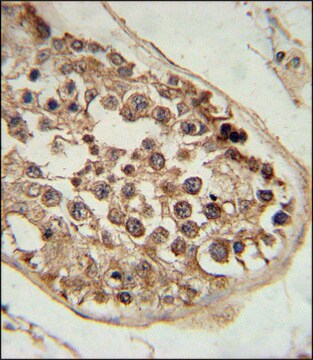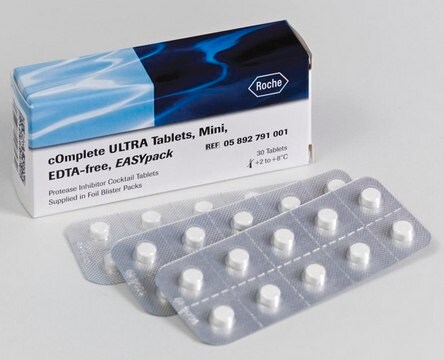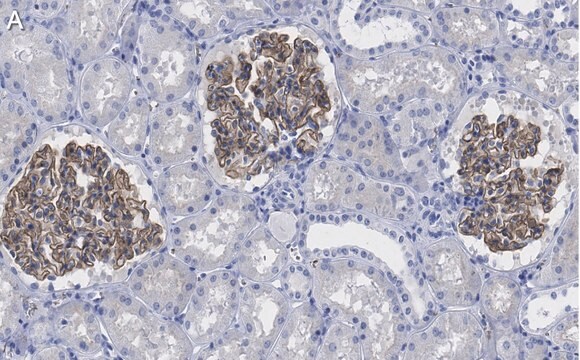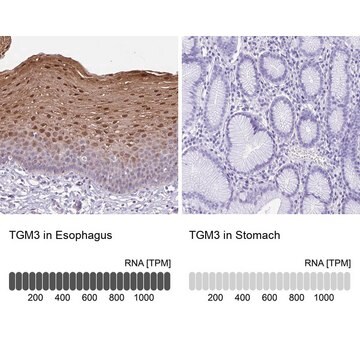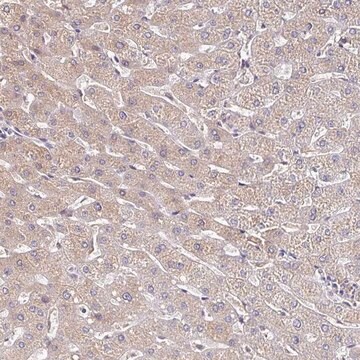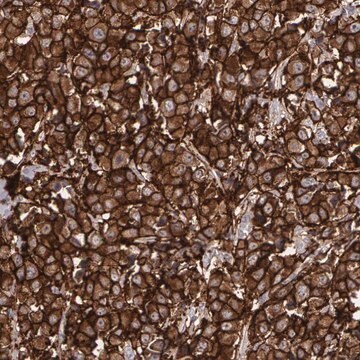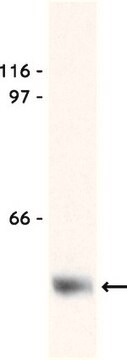推荐产品
生物源
rabbit
共軛
unconjugated
抗體表格
affinity isolated antibody
抗體產品種類
primary antibodies
無性繁殖
polyclonal
產品線
Prestige Antibodies® Powered by Atlas Antibodies
形狀
buffered aqueous glycerol solution
物種活性
human
加強驗證
orthogonal RNAseq
Learn more about Antibody Enhanced Validation
技術
immunohistochemistry: 1:500- 1:1000
免疫原序列
TDEGDNRVWCHVCERENTFECQNPRRCKWTEPYCVIAAVKIFPRFFMVAKQCSAGCAAMERPKPEEKRFLLEEPMPFFYLKCCKIRYCNLEGPPINSSVFKEYAG
UniProt登錄號
運輸包裝
wet ice
儲存溫度
−20°C
目標翻譯後修改
unmodified
基因資訊
human ... LY6K(54742)
一般說明
Anti-LY6K antibody produced in rabbit, a Prestige Antibody, is developed and validated by the Human Protein Atlas (HPA) project . Each antibody is tested by immunohistochemistry against hundreds of normal and disease tissues. These images can be viewed on the Human Protein Atlas (HPA) site by clicking on the Image Gallery link. The antibodies are also tested using protein array and western blotting. To view these protocols and other useful information about Prestige Antibodies and the HPA, visit sigma.com/prestige.
Lymphocyte antigen 6K (LY6K), a putative mouse glycosylphosphatidyl-inositol (GPI)-anchored membrane protein which associates with the unique germ-cell marker TEX101, is a cancer-testis antigen (CTA) that has been identified as a tumor marker and target for cancer vaccination against esophageal squamous cell carcinoma (ESCC). LY6K induces cell invasion and metastasis.
Rabbit polyclonal anti-LY6K antibody reacts with human lymphocyte antigen 6K.
免疫原
Lymphocyte antigen 6K Precursor recombinant protein epitope signature tag (PrEST)
應用
Rabbit polyclonal anti-LY6K antibody is used to tag lymphocyte antigen 6K for detection and quantitation by immunocytochemical and immunohistochemical (IHC) techniques such as immunoblotting, immunoprecipitation, and immunofluorescence. It is used as a probe to determine the presence and roles of lymphocyte antigen 6K in cell processes such as invasion and metastasis and as a cancer marker and antigen.
特點和優勢
Prestige Antibodies® are highly characterized and extensively validated antibodies with the added benefit of all available characterization data for each target being accessible via the Human Protein Atlas portal linked just below the product name at the top of this page. The uniqueness and low cross-reactivity of the Prestige Antibodies® to other proteins are due to a thorough selection of antigen regions, affinity purification, and stringent selection. Prestige antigen controls are available for every corresponding Prestige Antibody and can be found in the linkage section.
Every Prestige Antibody is tested in the following ways:
Every Prestige Antibody is tested in the following ways:
- IHC tissue array of 44 normal human tissues and 20 of the most common cancer type tissues.
- Protein array of 364 human recombinant protein fragments.
聯結
Corresponding Antigen APREST72930
外觀
Solution in phosphate-buffered saline, pH 7.2, containing 40% glycerol and 0.02% sodium azide
法律資訊
Prestige Antibodies is a registered trademark of Merck KGaA, Darmstadt, Germany
免責聲明
Unless otherwise stated in our catalog or other company documentation accompanying the product(s), our products are intended for research use only and are not to be used for any other purpose, which includes but is not limited to, unauthorized commercial uses, in vitro diagnostic uses, ex vivo or in vivo therapeutic uses or any type of consumption or application to humans or animals.
未找到合适的产品?
试试我们的产品选型工具.
儲存類別代碼
10 - Combustible liquids
水污染物質分類(WGK)
WGK 1
閃點(°F)
Not applicable
閃點(°C)
Not applicable
Ivenise Carrero et al.
Oncogene, 38(19), 3551-3568 (2019-01-19)
Although head and neck squamous cell carcinoma (HNSCC) has in the past been largely associated with tobacco use, human papillomavirus (HPV+) oropharynx cancer has in recent years emerged as the fastest growing type of HNSCC. Patients with HPV+ HNSCC have
Srikant Ambatipudi et al.
Genes, chromosomes & cancer, 51(2), 161-173 (2011-11-11)
The molecular mechanisms contributing to the development and progression of gingivobuccal complex (GBC) cancers-a sub-site of oral cancer, comprising the buccal mucosa, the gingivobuccal sulcus, the lower gingival region, and the retromolar trigone-remain poorly understood. Identifying the GBC cancer-related gene
Gregory R Johnson et al.
PLoS computational biology, 11(12), e1004614-e1004614 (2015-12-02)
Characterizing the spatial distribution of proteins directly from microscopy images is a difficult problem with numerous applications in cell biology (e.g. identifying motor-related proteins) and clinical research (e.g. identification of cancer biomarkers). Here we describe the design of a system
我们的科学家团队拥有各种研究领域经验,包括生命科学、材料科学、化学合成、色谱、分析及许多其他领域.
联系技术服务部门

